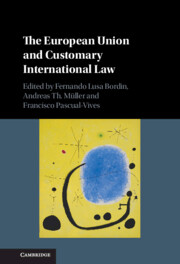Book contents
- The European Union and Customary International Law
- The European Union and Customary International Law
- Copyright page
- Contents
- Contributors
- Acknowledgements
- Cases
- Treaties
- Abbreviations
- Introduction
- Part I A View from the Outside
- Part II Looking in Between
- Part III A View from the Inside
- 7 Customary International Law in the European Union Legal System
- 8 The Direct Effect of Customary International Law
- 9 Customary International Law in the European Union Legal System
- 10 Customary International Law as a Source of European Union Law
- Index
10 - Customary International Law as a Source of European Union Law
The European Parliament, the Council and the Commission
from Part III - A View from the Inside
Published online by Cambridge University Press: 27 October 2022
- The European Union and Customary International Law
- The European Union and Customary International Law
- Copyright page
- Contents
- Contributors
- Acknowledgements
- Cases
- Treaties
- Abbreviations
- Introduction
- Part I A View from the Outside
- Part II Looking in Between
- Part III A View from the Inside
- 7 Customary International Law in the European Union Legal System
- 8 The Direct Effect of Customary International Law
- 9 Customary International Law in the European Union Legal System
- 10 Customary International Law as a Source of European Union Law
- Index
Summary
This chapter aims to examine a topic that up to now has received scant, if any, attention: the use of customary international law (CIL) by the European Parliament, the Council and the European Commission. To that effect, the actions resulting from the exercise of different powers of those three institutions (such as proposals, acts of secondary law, parliamentary questions, statements before the CJEU and other courts) have been taken in consideration. The examination of the practice of the political institutions of the EU does not reveal significant differences between them. References to rules of CIL from their side are relatively rare and mostly included in instruments with an international dimension. They all tend to invoke precise rules of CIL when doing so is essential for substantiating their legal position. They also seem to be aware of the fundamentals of this source of international law. By contrast, the European Parliament, the Council and the Commission fail to demonstrate (here is another common feature) that the rules of CIL they invoke are well established or that practice and opinio juris, as constitutive elements of CIL, concur. It must be highlighted as well that no pattern has been identified in this empirical analysis on the use of CIL by the political institutions of the EU.
- Type
- Chapter
- Information
- The European Union and Customary International Law , pp. 280 - 296Publisher: Cambridge University PressPrint publication year: 2022
- 1
- Cited by



